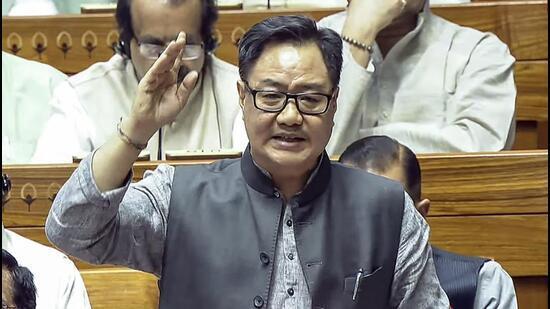
Title: Opposition creates confusion & leaves House: Rijiju in Rajya Sabha
The ongoing debate in the Rajya Sabha has taken a new turn with Union Minister Kiren Rijiju criticising senior members of the opposition for creating confusion and raising issues in the House but not staying back to listen to the replies. This remark was made during the discussion on the Waqf (Amendment) Bill, which has been a contentious issue in the Parliament.
Rijiju’s statement came after senior advocate Kapil Sibal, a member of the Rajya Sabha, compared the properties of Waqf bodies with those of other religious bodies. This move was seen as an attempt to raise doubts about the purpose of the bill and its potential impact on the Waqf properties.
However, Rijiju was quick to point out that Sibal’s statement was baseless and did not help in clarifying the issues related to the bill. The minister said that Sibal’s remarks created confusion and did not contribute to the debate in any meaningful way. Rijiju also added that Sibal and other senior members of the opposition do not stay back in the House to listen to the replies to their questions, which further adds to the confusion.
Rijiju’s criticism of Sibal and other opposition members came as a surprise to many, as it is unusual for a Union Minister to publicly criticise a senior member of the opposition. However, Rijiju’s statement was seen as a rare display of candor and a willingness to speak truth to power.
The Waqf (Amendment) Bill has been a contentious issue in the Parliament, with many opposition members raising concerns about its potential impact on the Waqf properties. The bill aims to regulate the management of Waqf properties, which are religious endowments that are managed by a body of trustees.
However, the opposition has been critical of the bill, saying that it is an attempt by the government to take away the autonomy of the Waqf bodies and to impose its own control over the management of these properties. The opposition has also raised concerns about the potential impact of the bill on the rights of the minorities and the freedom of religion.
Despite the criticism, the government has maintained that the bill is necessary to ensure the proper management of the Waqf properties and to prevent their misuse. The government has also pointed out that the bill is in line with the recommendations of the Sachar Committee, which was set up to study the social, economic and educational status of the Muslims in India.
The debate on the Waqf (Amendment) Bill is likely to continue in the coming days, with both sides refusing to budge from their respective positions. However, Rijiju’s statement has added a new dimension to the debate, with many wondering whether the opposition’s strategy of creating confusion and raising doubts about the bill will ultimately pay off.
In conclusion, the debate on the Waqf (Amendment) Bill has highlighted the deep divisions between the government and the opposition in the Rajya Sabha. While the government has maintained that the bill is necessary to ensure the proper management of the Waqf properties, the opposition has raised concerns about its potential impact on the rights of the minorities and the freedom of religion.
Rijiju’s statement has added a new layer of complexity to the debate, with many wondering whether the opposition’s strategy of creating confusion and raising doubts about the bill will ultimately pay off. Only time will tell how the debate will unfold, but one thing is clear – the Waqf (Amendment) Bill has become a contentious issue in the Parliament, and it is unlikely to go away anytime soon.




